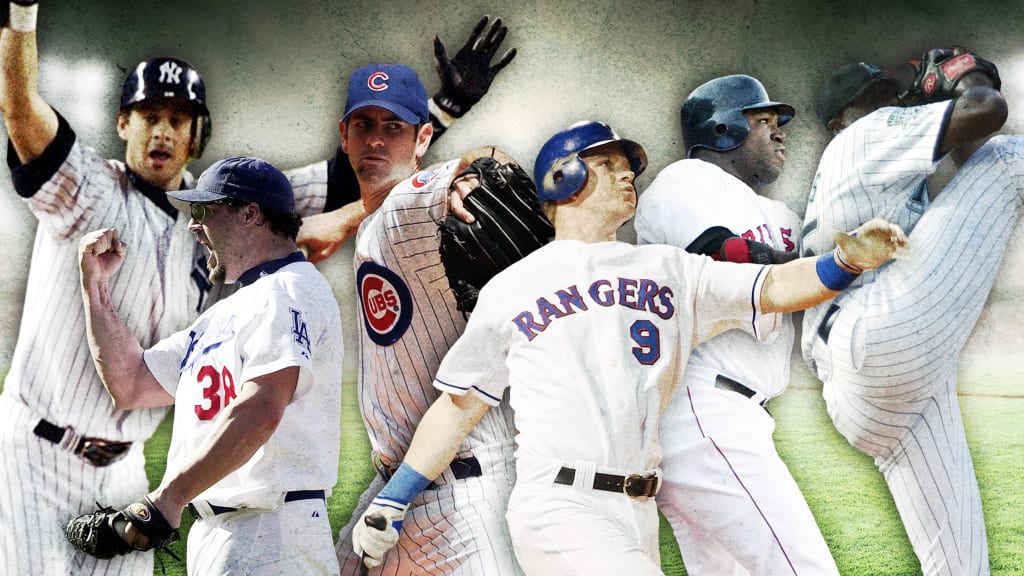
Throughout our hopefully short time without live games, we’ll be taking a weekly look back at a specific year in baseball history. What happened, why it mattered, what we’ll remember most. Send us the years you’d most like us to talk about at will.leitch@mlb.com.
So far: 1987
Year: 2003
NLDS: FLA over SF in 4; CHC over ATL in 5
ALDS: BOS over OAK in 5; NYY over MIN in 4
LCS: NYY over BOS in 7; FLA over CHC in 7
World Series winner: FLA over NYY in 6
MVPs: AL: Alex Rodriguez, TEX; NL: Barry Bonds, SF
Cy Young Awards: AL: Roy Halladay, TOR; NL: Eric Gagne, LAD
Rookies of the Year Awards: AL: Angel Berroa, KC; NL: Dontrelle Willis, FLA
All-MLB team (chosen by me, in 2020):
1B: Todd Helton, Rockies
2B: Bret Boone, Mariners
SS: Alex Rodriguez, Rangers
3B: Bill Mueller, Red Sox
OF: Barry Bonds, Giants
OF: Albert Pujols, Cardinals
OF: Gary Sheffield, Braves
C: Javy Lopez, Braves
DH: Frank Thomas, White Sox
SP: Roy Halladay, Blue Jays
SP: Mark Prior, Cubs
SP: Pedro Martinez, Red Sox
SP: Jason Schmidt, Giants
RP: Eric Gagne, Dodgers
RP: John Smoltz, Braves
In many ways, 2003 feels like the pivot point of 21st century baseball history, the last vestiges of the past hanging on before giving way to the breakthroughs of the future. Specifically, for three of the signature franchises in baseball -- the Yankees, Red Sox and Cubs -- 2003 felt like perhaps the most formative of years at the time. But it turned out, that past was just prologue.
Here’s what 2003 meant at the time for those teams:
Yankees: The 2003 season was the year that they fought off the rampaging horde that was the Red Sox. The Yanks hadn’t won a World Series in three years, but they also hadn’t fallen behind the hated Sox, whom they’d battled tooth-and-nail throughout the '03 season, all the way through a grueling, exhausting American League Championship Series. (Which featured a fight, between Pedro Martinez and Don Zimmer, of all people!) But they did hold them off, culminating in Aaron Boone’s legendary Game 7 walk-off homer off a Tim Wakefield knuckleball that did not knuckle. It was the finish of an epic series so draining that the Yankees were emotional afterward in a way they were not always so emotional. (See: Joe Torre and Mariano Rivera embracing, nearly in tears, celebrating after Boone’s homer.) It felt like the Yanks holding their place in history. But that would change. It would never be the same as this.
Red Sox: The Sox had one of their most likable, scary teams in 2003, one that looked, for all the world, like it was finally going to oust the Yanks menace. Until Grady Little infamously let Martinez stay in the game during ALCS Game 7, with a 5-2 lead but Pedro having thrown 100 pitches and looking for all the world like he was done. Little not only kept Martinez out there, he visited the mound after a mess had developed and inexplicably kept him out there. Next thing you knew, the lead was gone, and three innings later, Boone hit his homer. Lucy had pulled the football from the Sox again. Little was a goat, Boone was Bucky Dent and Boston had lost again. It felt like the Sox holding their place in history. But that would change. It would never be the same as this.
Cubs: The Cubs were so close to the World Series that, with a 3-1 lead in a potentially clinching NLCS Game 6, the FOX broadcast began showing black-and-white photos of the last Cubs team to reach the World Series, in 1945. Then Steve Bartman (or, more accurately, Moises Alou’s fit) happened, then Alex Gonzalez botched a routine double play, and then the floodgates opened. The Marlins scored eight runs in the eighth, the Cubs blew another lead in Game 7, and Chicago, so close, was denied by cruel fate again. If the Cubs weren’t going to make the World Series this year, would they ever? It felt like the Cubs holding their place in history. But that would change. It would never be the same as this.
The baseball world has changed dramatically since 2003, in every possible way. But you can make an argument that the history of those three franchises seemed stuck forever back then … until, it turned out, they weren’t. It took longer for the Cubs than it did for the Red Sox, but eventually, the pain of '03 just became a preview for the breakthrough that would come. There was a time when '03 felt like everything. Now it’s just the past -- and a prelude to a better future.
Here are 10 other fun facts from the 2003 baseball season:
- The first major transaction of the year might have been the biggest. Three weeks after the Twins waived a designated hitter named David Ortiz, on Jan. 22, the Red Sox acquired him. Ortiz went on to hit 31 homers and finish fifth in the AL MVP Award voting that year -- and he was, of course, just getting started. Ortiz ended up winning three World Series with the Sox and became one of the most beloved figures in Boston sports history. But in January 2003? He was just a guy on the waiver wire.
- Another pivot for the Cubs in 2003? This was the year everyone turned on Sammy Sosa. He hit his 500th homer in April, becoming the first Latino player to reach the milestone. But just over two months later, in the first inning of a home game against Tampa Bay, Sosa’s bat shattered, spraying cork all over the diamond. Sosa was ejected and ended up being suspended for eight games, but his sentence in the court of public opinion lasted much longer than that. The beloved, smiling home run hitter of 1998 was long gone.
- After three failed attempts, including one at Wrigley Field, Roger Clemens finally earned his 300th victory on June 13 at Yankee Stadium against the Cardinals. He also earned his 4,000th strikeout in the same game. Three pitchers have reached the 300-win plateau since Clemens did, and none have notched 4,000 strikeouts.
- One stadium opened in 2003: Great American Ball Park in Cincinnati. The first hit at the new venue, fittingly, was by Ken Griffey Jr. Two ballparks hosted their last baseball game in 2003: Qualcomm Stadium in San Diego (now SDCCU Stadium, home of the San Diego State football team and the Holiday Bowl) and the hated-and-beloved-in-equal-measure Veterans Stadium in Philadelphia.
- While the Yankees, Red Sox and Cubs all had their drama, the team that actually won the World Series had its own fun storyline. The Marlins fired manager Jeff Torborg in May after a 16-22 start and hired Jack McKeon, who was 72 years old and described by Marlins general manager Larry Beinfest as a “resurrection specialist.” Beinfest absolutely was not wrong. The Marlins went 75-49 under McKeon and claimed the NL Wild Card, then ran to their second-ever World Series title. McKeon managed through 2005 and returned to the Marlins in '11 in mid-June after manager Edwin Rodriguez resigned. McKeon turns 90 in November.
- Dodgers closer Eric Gagne won the National League Cy Young Award, and to date, is the last reliever to do so. And Gagne sure earned it. He didn’t blow a single save -- notching 55 in 55 attempts -- and he pitched 82 1/3 innings, giving up just 49 total bases. Not hits: total bases. Amusingly, Gagne’s one misstep that year was in the All-Star Game: He gave up three runs in the eighth inning, including Hank Blalock’s two-run homer, that cost the NL the game.
- The All-Star Game had its own peculiarity that year: It was the first ever that, to use the parlance of the time, “counted.” After a fiasco in 2002 that ended the game in a tie, MLB decided to give home-field advantage in the World Series to the league that won the Midsummer Classic. (It ended up being moot in '03, despite Blalock’s heroics, as the Yankees lost Game 6 of the World Series at home.) The All-Star Game determining home-field advantage in the World Series would last through '16.
- Barry Bonds won another MVP. Yawn. It was his sixth. He’d win one more in 2004 to finish his career with seven. He led the league in walks, on-base percentage, slugging and OPS, and it looked like it was as good as he could possibly be. And then he went out and put up a .609 OBP the following year. Also in '03: Bonds became the first (and to date, only) player in baseball history with 500 homers and 500 steals. He stole the milestone marker off Gagne, actually, and ended up scoring the game’s winning run. (It was a tie game, so it wasn’t a blown save.)
- Let us not forget about that year's Tigers. Detroit, managed by poor Alan Trammell, was one of the worst teams in baseball history, going 43-119. The Tigers actually avoided the most losses ever by, amusingly, winning five of their final six games. Poor Mike Maroth had 21 defeats, but Jeremy Bonderman (who was only 20 years old!) lost 19 himself. The reset of the season paid off, though: By 2006, the Tigers were in the World Series.
- The biggest omen in 2003 for where baseball was going? On June 17, W.W. Norton published Michael Lewis’ book “Moneyball,” about Billy Beane and the A’s. We’re still using the title to describe a revolution -- and now, just the way baseball is -- 17 years later.
